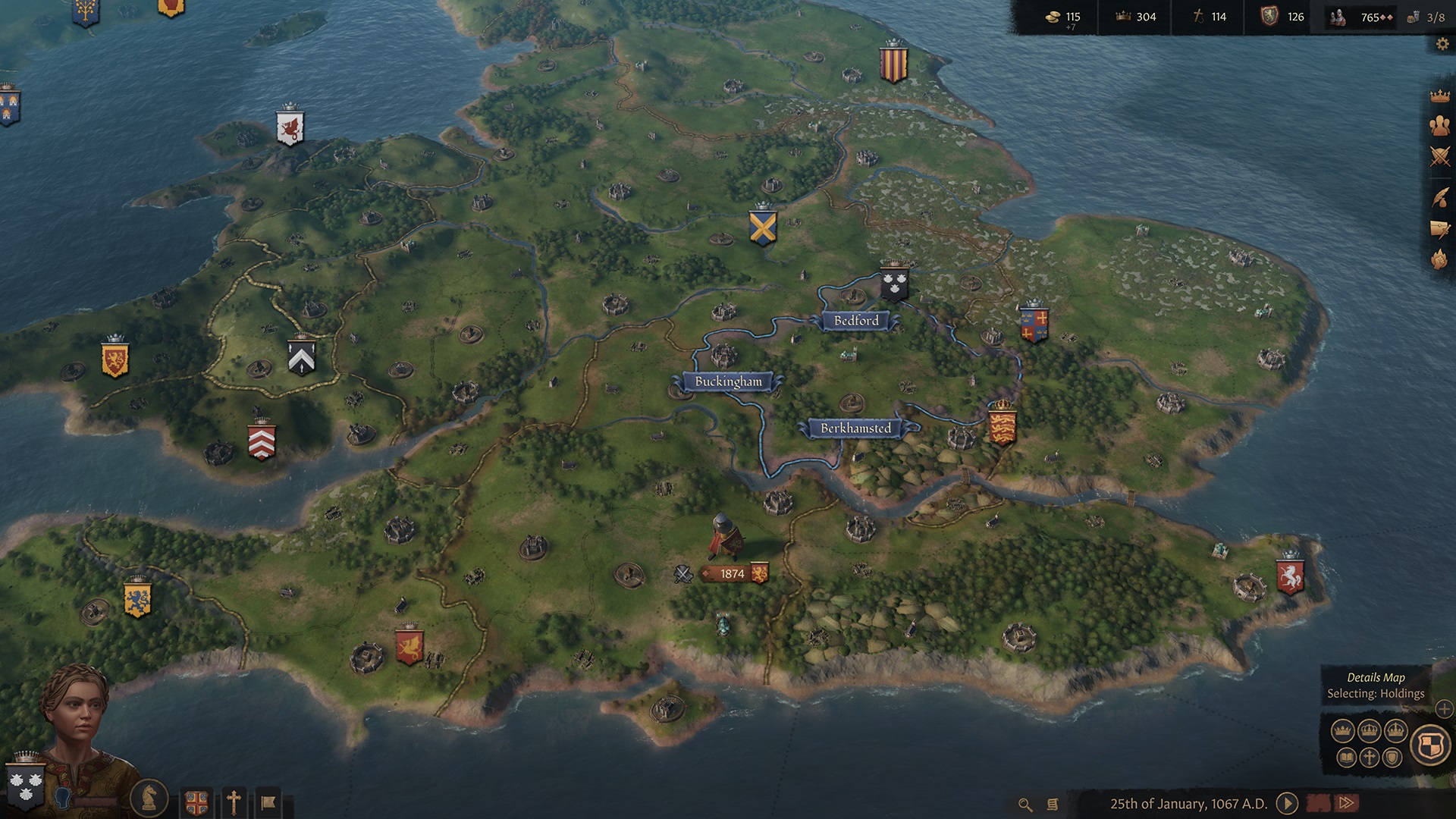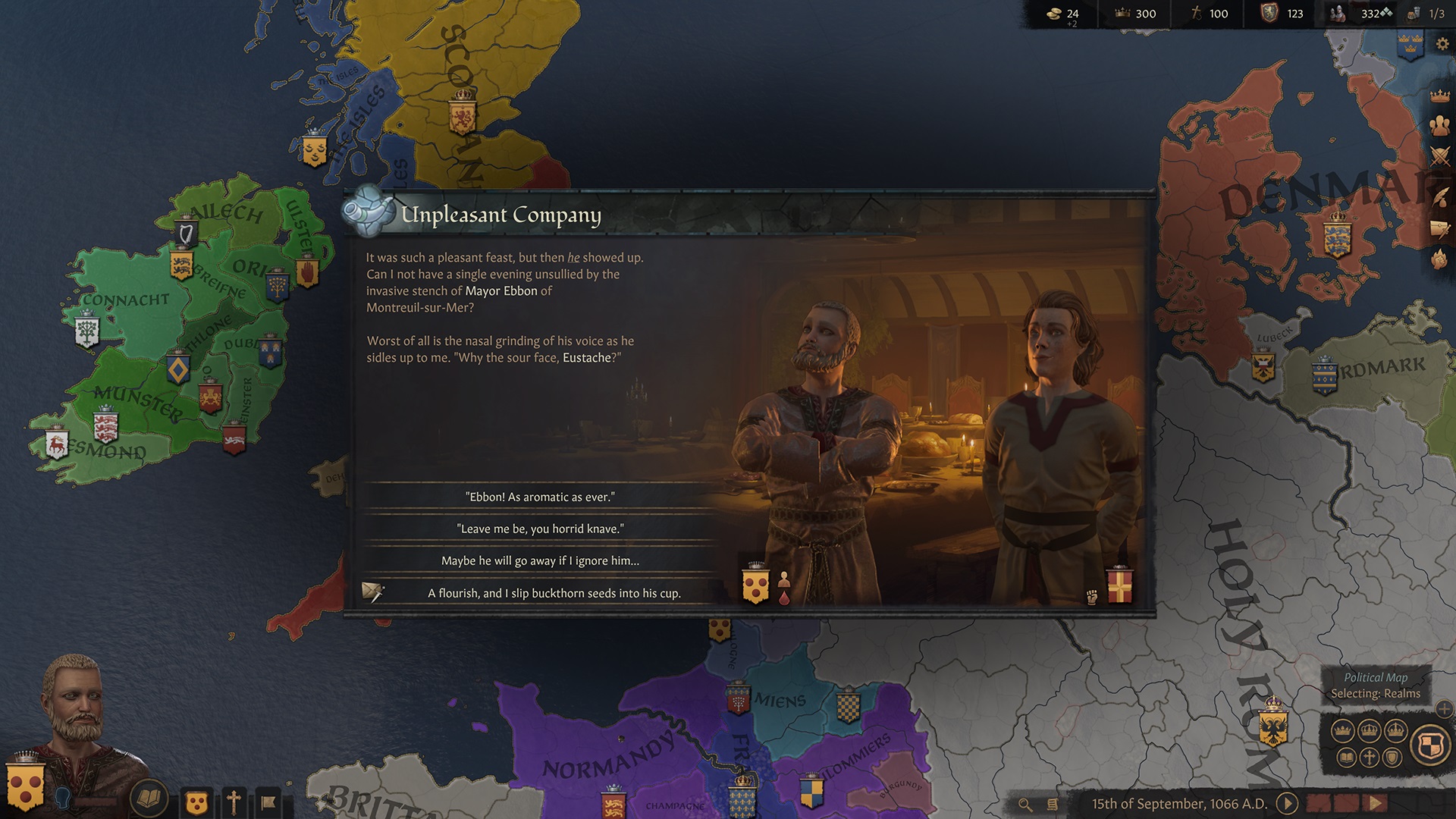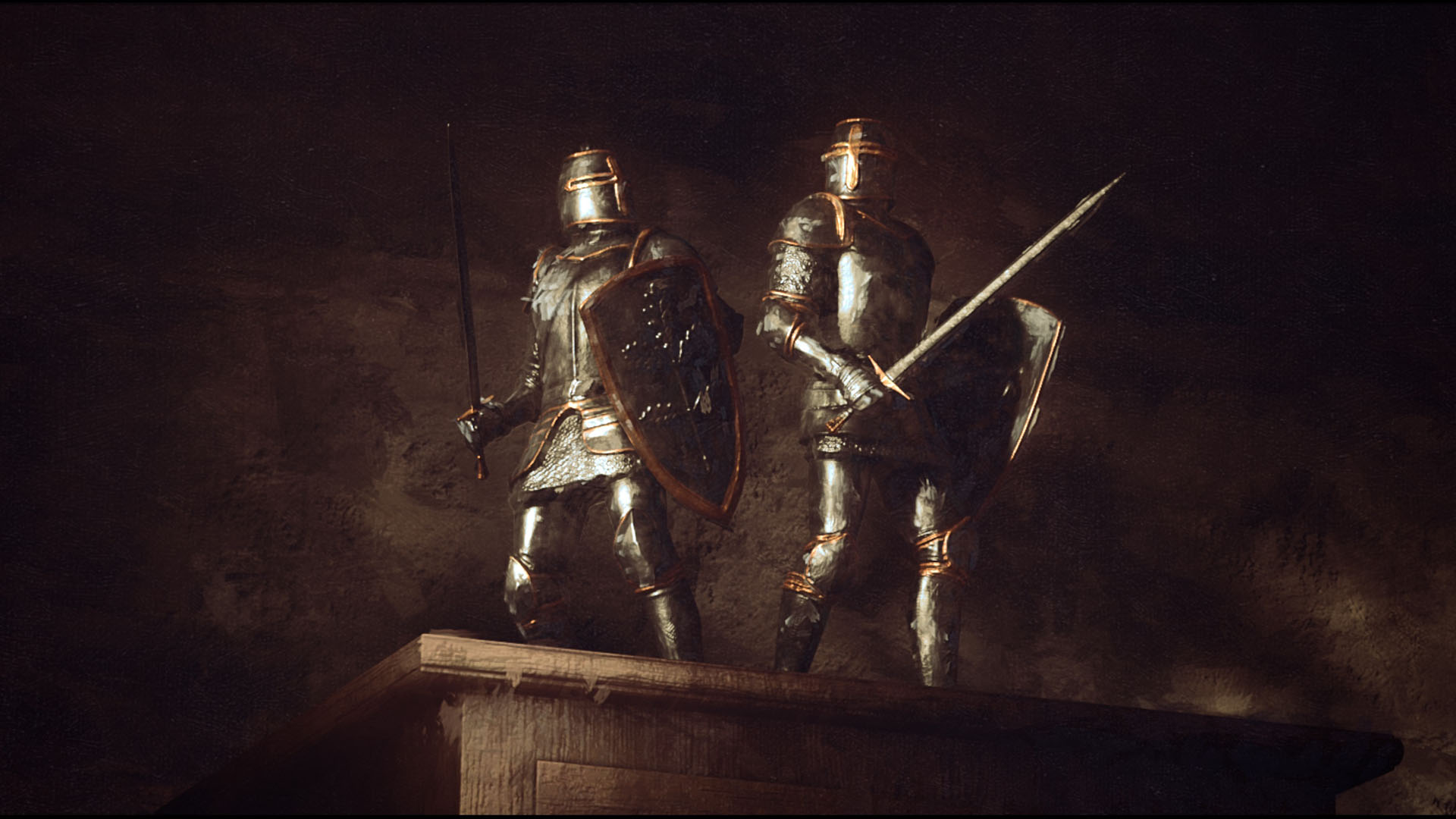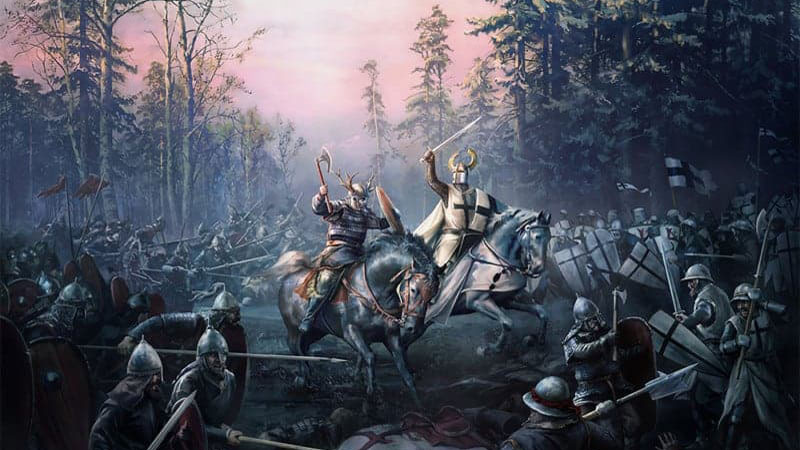Crusader Kings 3 is taking the grand strategy series deeper into RPG territory
The sequel explores what it means to be a ruler.
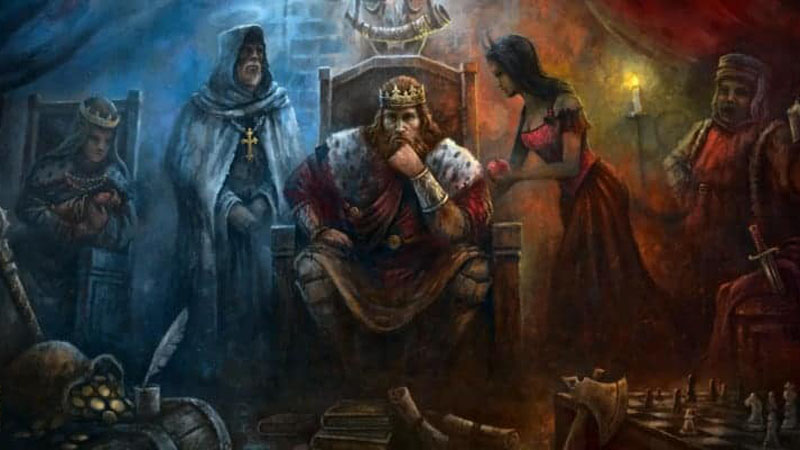
This article was originally published in PC Gamer issue 338 last November. For more quality articles about all things PC gaming, you can subscribe now in the UK and the US.
For the last five years Paradox has been working away in secret building the successor to a grand strategy behemoth. Crusader Kings 3 is familiar, bringing back many of its predecessor’s features, but this time the studio is approaching roleplaying with a renewed focus, giving extra attention to conniving rulers and their plotting extended families. It’s still a strategy game, but one where the RPG elements are given even more room to thrive.
Game director Henrik Fåhraeus emphasises that the studio isn’t trying to retread old ground and its goals are a bit different this time around. "Rather than trying to match the width of Crusader Kings 2, which is huge after seven years of expansions and DLC, we went deep instead, and thought about what it means to be a ruler."
Yet, it actually still seems pretty wide. Massive, really. There aren’t merchant republics, nomadic tribes are now just regular tribes and the inventory system—which lead designer Alexander Oltner admits was horrible for balance and led to stat bloat—has been tossed out, but the list of what’s been kept is a lot longer. Indeed, one of Crusader Kings 3’s most touted features, lifestyles, sprang from the Way of Life DLC.
There are a lot of things for a medieval ruler to worry about, from economic concerns to religious crises—you’ve got a whole dynasty and your realm demanding your attention—but through the lifestyle system you can work just on yourself. Previously that meant picking a focus, like warfare, and just getting a stat boost. In Crusader Kings 3 picking a lifestyle gives you access to a trio of trees that would look perfectly comfortable in an RPG. If you pick the martial lifestyle, for instance, you might focus on chivalry, unlocking thematically appropriate perks and eventually becoming a gallant knight.
Perks unlocked through these trees will help you guide your character’s personality as well as giving you some handy bonuses. Like its predecessor there are also traits that can be unlocked through actions and events. Spend a lot of time torturing prisoners and you’ll probably become a sadist. Then there’s the stuff you inherit, ranging from completely cosmetic things, like being a redhead, to practical ones, like being healthy. You can foster these traits in your heirs by picking a spouse with the traits you want to pass on—kings don’t have time for love, they’re too busy with their creepy breeding programmes.
"There are three main traits that you can reinforce, either negatively or positively," says Fåhraeus. "There’s health, intelligence, and beauty. They exist in three levels, going from positive to negative, so you can have a very ugly person or a slightly ugly person. But the personality traits, like courageous, cannot be inherited genetically. It’s very specific. If you want a smart, beautiful, brawny type of character, you can create that—you can breed them."
Keep up to date with the most important stories and the best deals, as picked by the PC Gamer team.
Be yourself
Despite being such a big part of Crusader Kings 2, role-playing was largely optional. If your character was a cruel idiot, that might be expressed through events, but you could play that character any way you wanted. In Crusader Kings 3, playing against your personality will have some dramatic side effects, all the way up to your ruler losing their mind. Thankfully there are outlets for stress, but not all of them are healthy. An athletic ruler might work out to relax, but some rulers might turn to booze, sex and torturing the poor unfortunates in their dungeon, potentially giving them some new, grisly vices. But at least they’ll get rid of those pesky stress headaches.
This doesn’t mean you’ll be forced to play a specific way. "We want it to mean something," says Fåhraeus, "but not to the level of being the only thing you think about. So it’s an interesting mechanic, but it’s not supposed to overpower your gameplay."
Dynasties can also level up. These are your immediate and extended families and the most important groups you’ll be interacting with. While your realm will contain lots of your dynasty members, they may also crop up in other kingdoms, spreading the influence of your ambitious bloodline. By having your dynasty all over the place and throwing your weight around you’ll earn Renown, which can then be spent on empowering your dynasty through the Legacies. If you want a bunch of conquerors you can start spending Renown to unlock perks in the warfare path, but there’s a catch.
"The interesting thing is that it’s unlocked for everyone in your dynasty," says lead designer Alexander Oltner. "So if you’re unlocking guile, you’re getting more success chance for your schemes, but it also means your brother will get more successes.”
You might end up making your rivals stronger, inspiring you to consider giving some land to a weak toady instead of an up-and-coming member of your own dynasty. But you’ll encounter other problems if you don’t let your dynasty thrive. They won’t like that, and they might decide to try and get more autonomy.
House party
Players are almost always the leader of a dynasty, but the system has become considerably more granular. Dynasties now feature cadet branches—houses—that get their own heraldry, a motto and some extra autonomy. Instead of CK2’s model, where dynasties are these big monolithic groups, landed members of your dynasty can try to carve out a bit more agency for themselves by forming an offshoot.
Don’t expect dynastic civil wars, but the houses will compete and try to expand their influence in an attempt to become more important. On the off-chance you end up losing your position as a dynast, you can try to reclaim your power by being the best head of a house you can be, until everyone recognises it. If your dynasty dies out, it’s the end of the game, but until then there are ways to become top dog again. House heads also get some powers that allow them to flex their muscles, like being able to legitimise bastards or disinherit people.
With these changes to dynasties, Fåhraeus is hoping it will shore up a problem with its predecessor. “One of the things that’s a weakness in Crusader Kings 2 is there aren’t any permanent entities that you can operate throughout the game. There’s not a nation, your titles can switch to a duchy or a kingdom and then back to a county, characters keep dying.” Only dynasties are permanent, at least until you run out of heirs, so effort has been put into giving players more progression and unlocks via dynasties.
If you can’t be bothered to keep the nobles happy, you can always rule by fear. By being a dickhead you can increase your Dread value, eventually making people too terrified to plot against you or cause offence. The impact depends on the vassal’s bravery, however, and bold vassals won’t be cowed by your bluster. It does mean you can have a viable kingdom even if loads of people hate your guts, but it could cause a problem for your heirs. They’ll inherit all that hatred, but people won’t be afraid of them.
Another way you can exert influence over people is through religion. Crusader Kings 3 features three large religious groups—Abrahamic, Eastern and Paganism—and then specific religions, like Christianity and Islam. Each is made up of tenets and doctrines, representing their rules and opinions on things like divorce and homosexuality. Some are just flavour, but others have a tangible impact. Then there’s the list of sins (yay!) and virtues (booo!) to round things out. But if none of them speak to your soul, you can just make a new one...
The last crusade
If you’re Catholic, for instance, but you think that communion should involve actually eating human flesh, you can form a new faith, nominally Christian but with lots of unique quirks. Cannibalism is a quirk, right? If you’ve got enough Piety to spend, you can make more radical changes, effectively constructing a new religion. And yes, you can become a pope, cosmic timelord, or whatever you want to call the head of your faith. That’s when you get to start doing the really fun stuff, kicking off crusades and holy wars.
Crusader Kings has always had a slightly awkward relationship with its titular system. It implies it’s all about conquest from the perspective of some Europeans, but that’s not remotely the focus, and certainly not now that years of DLC have made crusades drift further and further from the game’s centre. CK3 still isn’t really about crusades.
“I was never really happy with the name Crusader Kings; something like A Game of Kings would have been better,” says Fåhraeus. “It’s a ruler simulator set the medieval times. I prefer to be able to cover the whole world, or at least the whole Old World, somehow. The problem is that some countries like China or the Byzantine Empire weren’t really feudal. So you have to either make the decision to shoehorn them in, or you don’t let them be played.”
If crusading does tickle your fancy, however, you’ll still be able to do plenty of it, though Paradox isn’t ready to spill the beans about war. Well, not all the beans. Recruitment has been tidied up a bit, splitting troops into levies and hired warriors. Levies are the peasants toiling away for you and your vassals, and while you’ll have a lot of them, they’re not that great in a fight. But you can also hire special units like cavalry, or someone who knows how to hold a sword properly. “CK2 had a confusing number of troop types that were mixed up in strange ways,” says Fåhraeus. “You couldn’t make meaningful decisions with this mess of stuff, but now you can keep your professionals separate from the levies.”
Call the pros
Knights can join your cause, too. They’re a special kind of unit, of the heroic persuasion, and after training for their whole lives and splashing out on the best gear, they’re ten times more effective than the poor blokes with their farming pitchforks and armour made out of kitchen utensils. If you want to do some real damage, slip some knights into your growing army.
The new map might also have an impact on warfare. It covers the same area as Crusader Kings 2 does now, but with a much larger scale. All the provinces have been unstacked and expanded, with locales that were previously hidden away in menus now being displayed on the map itself. This means there are potentially more targets for you to hit, while the larger playing field also means more opportunities for Paradox to sneak in terrain that can modify fights somewhat.
The scale might also help if you’ve got a bit of an ego. "It makes you feel more powerful, even when you’re playing a smaller kingdom, if the kingdom is more than just a few provinces on a map," says Oltner. Of course, it’s not the size of the kingdom that matters, it’s how many enemies you’ve got locked up in your dungeon.
It once again sounds like a lot to juggle, and that’s before we even get to the new era-based tech system that will apparently stop players from ballooning in size in the early part of the game, or the currently under wraps economic details. Fåhraeus says it’ll be easier to parse this time, at least, with a Stellaris-like tutorial and a suggestions widget that gives you hints about what you should do, highlighting interesting opportunities.
Crusader Kings 3 is shaping up to be less of a departure and more iterative than I expected, given how refreshing its predecessor was. It’s drawing out and expanding the most popular features while also introducing things players have been requesting for years, but so far it’s not provided many surprises. It’s absolutely playing to its strengths, though, and the extra emphasis on role-playing should please nearly everyone.

Fraser is the UK online editor and has actually met The Internet in person. With over a decade of experience, he's been around the block a few times, serving as a freelancer, news editor and prolific reviewer. Strategy games have been a 30-year-long obsession, from tiny RTSs to sprawling political sims, and he never turns down the chance to rave about Total War or Crusader Kings. He's also been known to set up shop in the latest MMO and likes to wind down with an endlessly deep, systemic RPG. These days, when he's not editing, he can usually be found writing features that are 1,000 words too long or talking about his dog.
